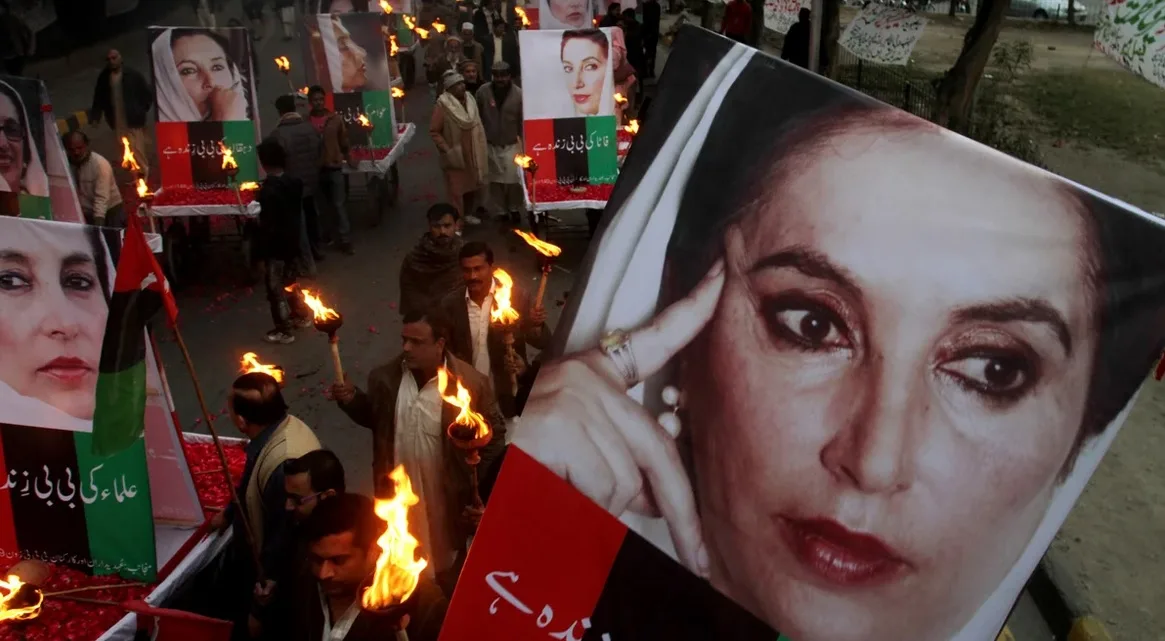By Sara Arshad
“Leadership is a commitment to an idea, to a dream, and to a vision of what can be.”
Perhaps the greatest turmoil faced by a young Pakistan was the execution of Prime Minister Zulfiqar Ali Bhutto in 1979 by Military Dictory General Zia ul Haq. To the world’s surprise, the Islamic world welcomed the first female prime minister in 1988 in Pakistan in the form of his daughter Benazir Bhutto and I could see a change in the country. Everyone seemed to cherish her win in elections and getting nominated as first lady stateswoman. Whenever she used to appear on television, the entire country became silent and listened to each and every word of her with great respect. She was full of determination and could see the challenges of the Pakistani public with pure heart.
December 27, 2007, was a horrible day for the people of Pakistan when she was murdered because her followers considered her the only hope left with them.

This dreadful and ill-fated day when she was leaving a huge public gathering after delivering her speech in Rawalpindi Pakistan, she was shot and died at the spot. The moment the news of her brutal murder was publically announced, people became enraged and Pakistan witnessed the largest public protests in its history following her murder. That night was eerie and mass protests erupted in all parts of the country unitedly. Several banks, buildings, and ATMs were broken down and destroyed. Means of transportation were burnt. A large number of people took shelter in narrow streets and spent the night under the roof of a cold winter night.
More than 100 people lost their lives in the incidents relating to mass protests due to shootings by the police or from crossfire between different groups during the last 48 hours. Pakistan lost its bravest leader ever and the loss was beyond comparison.
In order to mark her 70th birthday Harvard class 73 organized a virtual event where speakers honoured and acknowledged Benazir Bhutto’s legacy. For me, it was a lifetime experience because having heard stories about Benazir from my family and friends or reading history from different books is immensely different from listening to the classmates of Benazir Bhutto of Harvard batch 1973. It was an emotional yet inspiring learning-based event that had a 60-minute time duration about Benazir Bhutto’s life’s personal reflection followed by a Q&A.
Marion Dry, co-founder and chair of ClassACT HR ’73 shared the story of the creation of the Benazir Bhutto Leadership Program and its impact. She shared her experience that Benazir Bhutto was a friend of many in class 1973. She was introduced to Benazir in her freshman year. At that young age, Benazir left a very strong impression at only sixteen which could equal that of seventy.
Moving forward to 2013, some students of class 73 created Act 73. It included programs like BBLP (Benazir Bhutto Leadership Programme) that assisted students from third-world countries to gain a master’s degree from Kennedy’s school. Much of BBPL’s ideology related to human rights and peace matches that of Benazir. It especially promotes education in Islamic countries.
It hardly ever occurs that Benazir Bhutto’s family isn’t present in the talk of her remembrance, even today her sister, Sanam Bhutto along with her husband and son attended. Victoria Schofield, author of “The Fragrance of Tears”, and her friends from Washington attended.
Benazir became the light of people’s hearts. Peter Galbraith further goes into how young she was at every milestone of her life. Only sixteen years of age while entering Harvard, twenty-four when Z.A. Bhutto was assassinated, and 35 when she became the Prime Minister. Benzair faced a big cultural shock while meeting his parents. Usually, the contrast between a Pakistani family and an American family is significant.
Even as an undergraduate, she had a strong political sense. But that did not give much fruit when faced with the dictatorship in Pakistan. Several times, she was confined in forms of house arrest, Karachi Central Jail, and Sukkar Jail.
With democratic relationships and policies almost destroyed, Peter’s meeting with Benazir in 1981 became almost impossible. However, he did manage to send her a note that she replied back to with a smuggled letter. Benazir expressed how the grades and essays, and the talk of politics seemed joyful in Harvard but now she realizes how she failed to fully understand how important they were, as important as the air we breathe and the water we drink. 1987, a supposedly quiet year for Benazir where she got married and started a family, didn’t last long when in 1988 a plane carrying General Zia ul Haqq “literally fell out of the sky and the prospect of meaningful elections became real.” Benazir restored democracy in 1988 after dictatorship and died in 2007 while restoring democracy too. Peter urged her to start a normal life, and though she wanted it, she never acted on the idea.
Laila Khondkar, funded under the BBLP, did several leadership and human rights courses in her year at the Harvard Kennedy School and continues the legacy of Benazir in Dhaka in the form of trying to make a world where women are treated equally in fields such as politics. She talked about the need for collaboration and contribution of different organizations in order to combat social issues. She also collaborated on a future project for Bangladesh with a member of ACT’ 73 called “ Kids Care Everywhere.”
South Asian countries have a deep-rooted history of violence that the next generations carry with them. In order to combat this, Laila states, that only law reforms aren’t enough and that social norms play a big role. Disrespect and violence have been normalized throughout history.
Umar Mukhtar Khan, president of Harvard Club for Pakistan shared a lovely memory with Benazir when she went to his school and he showed her a photo in a photographic exhibition and having met with her at his uncle’s residence. All the speakers had a connection with Harvard University.
Talking about her democratic reconciliation, her stance against extremism, and her progressive politics was strong. Returning to exile in 1986 and subsequently becoming a Prime Minister in 1988, she brought all the stakeholders in Pakistan’s complex political landscapes together and signed the Charter of Democracy with her arch-rivals. She stood like a rock against extremism despite the fact that her life is in danger still she never became biassed which resulted in her fateful murder on 27th December 2007. She made Pakistan a much safer place before leaving through her policies. She believed in women’s rights, minority rights, freedom of the press, and social issues. She was always found standing in front of protecting vulnerable communities.
Her fellow friends of class 73 left a deep impression as Nuala Walsh quoted in her closing remarks that “old photo never fades.” Having received the Nobel Prize or becoming the Prime Minister, Peter Galbraith, and Benazir Bhutto are still Johny and Pinky of class 73. Benazir. Her legacy will continue in people like Laila and many who are pursuing her mission. Excellent moderation was done by Lee. Umar shared his experiences of how Benazir chose leadership and unifying spirit.
Benazir’s job was not easy but she left a strong message to those who are struggling to achieve rights. Her story is shared as a symbol of courage and victory in every corner of the world. Bhutto is another name for courage, determination, and persistence.
“Benazir’s trade of courage and character are only associated with the finest people.”—Nuala Walsh
 Note: Sara Arshad is a teacher and a writer based in Lahore.
Note: Sara Arshad is a teacher and a writer based in Lahore.
Disclaimer:
The views and opinions expressed in this article/Opinion/Comment are those of the author and do not necessarily reflect the official policy or position of the DND Thought Center and Dispatch News Desk (DND). Assumptions made within the analysis are not reflective of the position of the DND Thought Center and Dispatch
